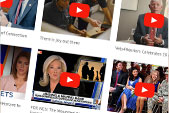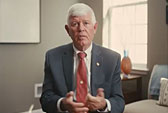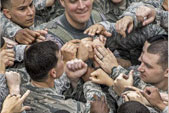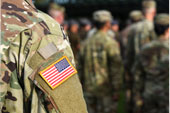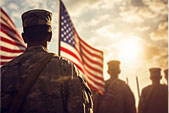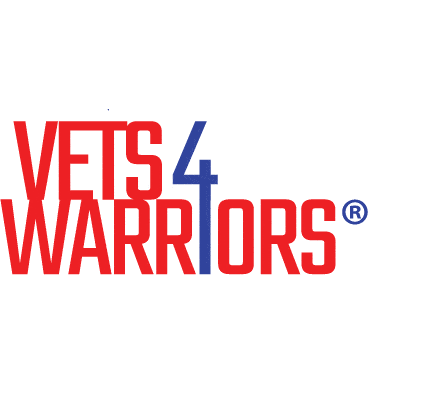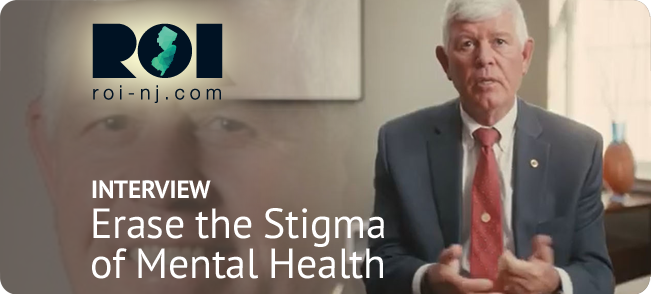Retired Army Maj. Gen. Mark Graham, Executive Director of Vets4Warriors, sits down for an interview with Military Matters
Vets4Warriors leader: Erase stigma of mental health with consistency of approach
Retired U.S. Army Major General Mark Graham is the executive director of Vets4Warriors, a peer-to-peer support network that provides immediate help for military veterans struggling with mental health issues.
Vets4Warriors was founded in 2011 and is housed at the Rutgers University Behavioral Health Care National Call Center located on the Piscataway campus.
As an indicator of its work, Vets4Warriors received in September a $1 million grant from Face the Fight – a coalition of corporations, foundations, non-profits and veteran-focused organizations joined to raise awareness and support for veteran suicide prevention.
Graham retired from the military in 2012 after 35 years of service and is now a state leader in the fight to address the mental health issues and suicides that plague the military. A Pentagon report released two weeks ago reported the suicide rate among active-duty military increased in 2023.
Graham lost a son killed in action in Iraq and a second who died by suicide while in ROTC training to become an army doctor.
This is a follow-up to a July interview with Graham.
Military Matters: When we spoke over the summer, you said Vets4Warriors was averaging 24 calls per day. Has that changed?
Major General Mark Graham: For the last several months we have averaged 24 to 26 calls per day. Remember, these are all new callers. The vast majority of our callers are veterans. It is great they are reaching out.
When they call, we ask them to tell us why they called, and we ask them ‘what’s going on?’ We also ask them how they heard about us.
More and more we are hearing them say ‘I heard about you from a friend.’
This is important because early on in our existence we never heard that. It used to be veterans did not want to call or tell somebody that they called a helpline because of the stigma. It seems more OK today to tell someone you called to get help.
MM: The stigma of admitting to mental health issues is still a significant issue in the military. Some progress has been made but how can the military truly de-stigmatize the act of asking for help?
MG: Consistency is the key. If someone goes from one military base, where the environment made it safe to get help, then goes to another military base where you don’t get the same feeling – it’s like two steps forward and one step back.
If there is a consistent message in the workplace that says if you need help, it is ok to get it – that is a healthy environment whether it is a civilian workplace or a military base.
Easy to say but hard to do. Be consistent. We need to make sure everyone is rowing in the same direction.
MM: The holidays are upon us. Do you make provisions for more calls during the holidays?
MG: Yes, we staff up for the holidays.
We have enough years of data to see where we typically have an increase in call volume, and it is on the holidays, though not always on the holiday itself.
Thanksgiving Day we don’t get many calls, but the day after we do. Usually on the holiday, individuals are with their families, friends, and loved ones.
But it is the day after when they are by themselves and are lonely again; and there is also survivor’s guilt – ‘why am I with my family and my buddy is not?’
We also tend to see an increase in calls around Veterans Day, Memorial Day and 9/11. We had a huge increase in calls during the withdrawal from Afghanistan so you can’t predict those times.
MM: What are the issues most frequently cited by your callers?
MG: Anxiety … loneliness … isolation are the top issues we hear. With anxiety there are usually words like worried, nervous, overwhelmed.
There are also complaints about difficulty sleeping and rumination – remembering bad things they have seen or experienced.
We are also spending more time in the transition space helping veterans. We try to contact them before they begin their transition and then talk to them during the first year of the transition.
That can be a really vulnerable time. The two main things service members miss when they leave the service are the comradery and the sense of purpose they knew in their military lives.
MM: Numbers show that women veterans are becoming a fast-growing demographic. Do you get a lot of calls from women veterans?
MG: Women veterans are about 20% of our callers.
There was always a concern about homelessness with women veterans. It is still an issue. If a shelter does not take children, the woman veteran is not going there without her kids. I think now more shelters are letting in children.
There is the sexual trauma issue. You see a lot more of that on the women’s side. We get more callers wanting to speak to a woman veteran. That is why we have worked hard to make sure we have a female veteran on every shift.
MM: There are literally hundreds of organizations around the country focused on the issue of helping active military and veterans deal with mental health issues, and yet, when you look at the latest DoD report released last month, the problem does not seem to be getting better.
MG: Between the Veterans Administration and the thousands of organizations trying to help – we could all be out there 24/7 and there still aren’t enough of us working on this.
It is good that there is more research going on in this area. It is really important. But before that research catches up and starts helping more veterans, we need to be there so the veterans know they are not alone.
There are a lot of people out there who need help.
I talked to a guy last week – a Vietnam Era veteran and he told me he never reached out to anyone after Vietnam and he said, ‘I probably should have.’
I gave him my card and told him there is still time. That is why it is important to reach out and spread the word. You just never know.
MM: What can people do to help the veterans you help?
MG: They can be ambassadors of our program. Help us get the word out. We have information about the program on our website. As an ambassador you will have the tools and resources you need to foster peer relationships that have positive impact on the lives of people who need help.
You can help us make sure no one is alone.
Also, anyone looking for employment – please reach out to us.
We have positions available – especially per-diem positions – and we are always looking for people who want part-time work.
Not everyone can do this work. Nobody is calling us because they are having a good day. If they are calling us, it is because they are having a rough time. It is tough work, but it is very rewarding.
And of course they can donate to support the Vets4Warriors program. I don’t say that often enough.
The read the interview online at ROI-NJ.com CLICK HERE.

